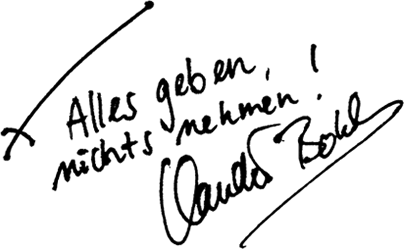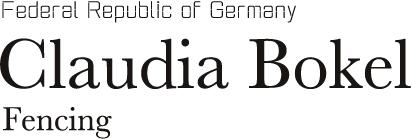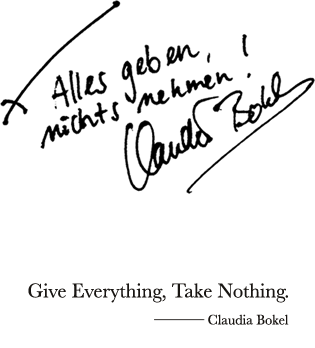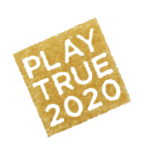




© Keita Yasukawa

Sport has taught me a lot. There’s a lot to be learnt from both the joy of winning and the experiences of losing. Developing our skills is not the only thing we can gain through hard training. All those “moments” in sport will inspire you as a person, and spark the same kind of inspiration in society as a whole. And to make sport inspirational in a real way, it must be clean. Experiences had through clean sport are some of life’s most wonderful assets.
【Give Everything, Take Nothing.】
"Devote everything to sport and take nothing prohibited"
This is the current slogan of NADA, National Anti-Doping Agency Germany, but it greatly overlaps with the approach to sport while I was active in sport.
The environment around doping, and the consciousness of people about it, changes year by year. Those changes were particularly striking during the time I was active as an athlete. The World Anti-Doping Agency was established in 1991 to alert the sporting world to the longstanding issue of doping. At that time I was a junior athlete, 17 years old. Luckily, I was in a very clean competitive environment, and no one recommended that I take prohibited substances in sport. And I am thankful today for having been among people and in an environment that protected me from it. At the same time, in turn, I feel it my duty to protect young athletes. It’s a duty to convey the value of clean sport as well as what great risks doping brings.


© Alexander Hassenstein / Bongarts

I began fencing at age seven. By that time, I had got used to watching my older brother and sister fence, but had been too young to join in. Even today, I clearly recall the joy I felt when at long last my father gave me the go ahead to begin.
At age 16, I left the small town in the Netherlands that I’d been brought up in, and attended a boarding high school in Bonn, Germany. I made up my mind to launch myself into fencing while attending school there. Leaving my family and friends and going to school far away and alone, I felt isolated, and there were times at first when I felt lost in the face of a new language and culture, but all the while I remained fiercely dedicated to fencing, with like-minded team mates whom I could achieve an ever higher level of skill with. Looking back now, that decision I made was the biggest turning point in my life. What I learnt at high school forms the core element of the person I am and the life I live today. What proved particularly useful for me were the time management skills I learnt through group life, and how to cope with emotions when winning and losing. Those skills not only proved useful in the sporting environment, but also became two of the most important elements of my life.
By the time I retired from active competition in 2008, I had achieved a record of which I am very proud. My major competitive achievements were being twice world junior champion, twice world champion, and competing in the Olympics three times. Yet, what most sustains me now and has the greatest weight is what I experienced in the process of reaching those successes.
Sport taught me to value the idea of “the process more than the results.”
People are naturally inclined to advance toward their goals and results efficiently, in a straight line, but it’s in the twists and turns of the process that the things of importance make themselves apparent, like the things you learn from colleagues who are working towards the same goal, and repeated effort and trial and error.

© Keita Yasukawa
I am currently active as a member of the IOC Athletes' Commission and the IOC Executive Board, as well as the Athlete Committee of the World Anti-Doping Agency. Supporting the next generation of young athletes, full of potential, is something I very much feel to be of the most value.
As a young, active athlete, I never imagined myself becoming involved in the activities I am today. These interests and desires have progressively come to the fore in my later years.
One big reason for getting interested in anti-doping was that I had majored in chemistry at university. More than anything else, having received as much as I have from the sporting world, I want to give back what I can—even if just a little. It goes without saying that maintaining and furthering the cause of clean sport is the most important item on my agenda, but there are a lot of other things too that should be improved for the sake of future athletes. Furnishing them with an environment to compete in and, at the same time, with an educational environment where school life for the athletes can be beneficial is, I believe, very important. I also believe that athletes’ focusing solely on sport will not be enough when it comes to retiring. They have to ask themselves how they tie in what they have learnt through sport to their lives after retirement. Providing guidance on how to maintain a good balance is crucial.
After retiring in 2008, I’ve been broadening my activities with every passing year. I’m so busy now that I hardly get to go home to Germany anymore. I put my efforts into proactively making opportunities to speak face-to-face with athletes locally, on their home ground, visiting countries around the world, talk to them, listen to what they have to say, and see what can be done for them. The future of sport is not, I believe, something to be developed by the adults who are not active athletes and discuss things around a table.


© Keita Yasukawa
Looking over the history of doping issues, it can seem like years and years of repeating the same thing. Whatever progress is made in science, there will be no solution unless the mentality of athletes and those involved around them change.
A line must be clearly drawn between what is acceptable and what isn’t, and we must press forward with making the issue clear. Recognition of the value of clean sport has to be further enhanced. It is important to explore sound ideas and seek advice from all quarters and work together.
For the sake of the children who will take the lead as the next generation, they must be given an equal opportunity to participate in clean sport and receive an education, wherever they are in the world. That is the ultimate ideal.
There is nothing I want more but for our efforts to guide the future of sport towards a bright, clean path of development.

© Keita Yasukawa
It’s no exaggeration to say that the person I am, here and now, was shaped by sport. That’s how big an influence sport has had on me.
I have always respected and kept faith in clean sport.
I have confronted myself honestly through clean sport, setting my goal, and working towards it by throwing myself into hard training. And even while experiencing setbacks, I still made it to world champion.
I firmly believe that if I could do it, anyone can.
【Give Everything, Take Nothing.】
"Unconditionally, unstintingly, pass it all on to the next generation"
As an athlete who has retired from competition, my take on this phrase now is as follows.
It means not holding back, but conveying to the next generation everything I’ve experienced to date through clean sport.
Over the years between my starting fencing at age 7 and retiring from it at age 35, I received a great deal of valuable things from sport. Now it’s my turn to give back.
I want a future where the next generation conveys the value of sport to the generation after it, in the same way.
My wish is for an ongoing virtuous cycle of clean sport.



Born in Ter Apel, in Groningen Province, the Netherlands.
Moved alone to Germany at age 16 and joined the Olympischer Fechtclub Bonn, which has produced numerous Olympic athletes. Became World Junior Champion after just three years.
Participated in three Olympics, and was in the team awarded a silver medal at the 2004 Athens Olympic Games.
Decided to retire as an active athlete in 2008, and became actively involved in setting up an environment for sport and education, being elected to the IOC Athletes' Commission, getting a degree from Radboud University in the Netherlands, and more.
As of now, November 2015, is undertaking global-level duties in numerous bodies, as the chairperson of the IOC Athletes' Commission, a member of the Athlete Committee of the World Anti-Doping Agency, etc. and is an associate partner in the S.U.P. leadership program and career development program.